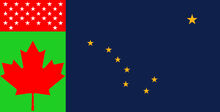
The flag of the American Confederacy, retained from the North American Union.
The American Confederacy is a federation of states located in the western half of North America. It was founded on February 13, 2017, replacing the North American Union, by the final NAU President, Haylie Modine. It is a state known for its socialist polices as well as its embrace of minoritarian policies. It has also been called an "extreme" feminist nation after it took the step to ban Nathanism from its territories following an uptick in rapes that were blamed on Nathanite gangs.
At A Glance
Nation Name: The Confederation of American States
Demonym: American
Capital: Sacramento, California
Independence or Founding Date: February 13, 2017
Population: (see list of countries by GDP)
Official Language(s): American English
Government Type: Constitutional Republic
Head of State: President Haylie Modine
Head of Government: President Haylie Modine
Official Religion: None
Largest Religion: Petrine Catholicism
Constitution: Yes
Economy Type: Mixed market socialism
Currency: American dollar ($)
Summer Time: Yes
Calling Code: +1
Internet TLD: .ac
Maritime Boundary (nm): 24
Aircraft Registration Code: ACS
Political Rating: Minoritarian Republic
Military Size: 2% of the population in peace time, can reach up to 5% at wartime or higher if needed.
Military Capability Score (out of 100, rating by Worldwide Defence Trade Association (WDTA)): 70 (Above Average)
Technological Innovation Score: Military (WDTA): 60/100 (Average), Scientific (University poll): 80/100 (Good), Other (University poll): 80/100 (Good)
Economic Rating (by Standard & Poor): 60/100 (Average) (See list of countries by GDP)
Economic Freedom Index (by Standard & Poor): 65/100 (average mix of economic freedoms curtailed by government regulations, though there are regional differences)
Health Care Rating (by Doctors Without Borders): 70/100 (Above Average)
Health Care System: Universal
Political Freedom Index (by Reporters Without Borders): 50/100 (Poor)- Although freedom of the press, expression and to protest are enshrined in the Constitution, the government controls all media and heavily suppresses any opposition to its policies.
Drug Laws: Recreational drug trade is legal, but licensed.
Gun Control: Restrictions vary by region.
Environmental Policy Rating (by Greenpeace): 100/100 (complete attention paid to environmental concerns)
Governance
The American Confederacy is a centralized republic containing five different regions. The head of state for the Confederacy is the President, who lives and works in the American Presidio, a sprawling complex that doubles as the Confederacy's main army base. According to the Constitution, the President retains the ultimate power amongst laws in the land, with the President's power only being curtailed or removed when the House of Lieutenants unanimously support the measure, although clauses grant rare exceptions to this.
Administering the Confederacy is the House of Representatives, who are elected to four year terms. The House is led by the President, who is elected by the House one day after the House is formally elected. Both elected Representatives and the President may continue to serve as long as they continue winning elections. The Constitution states that only the President may propose laws, upon which the Representatives examine the proposal and debate changes as necessary. The Representatives then vote on the final bill, and should the bill receive a vote of majority, it is passed back to the President. The President then has the authority to veto the law or sign it into law- if the President wishes to change the final bill, they must submit an entirely new proposal for the Representatives.
Serving as the country's top judiciary is the House of Lieutenants, two each voted by the people in each region. Any challenges to laws passed by the President can be brought all the way to the Lieutenants, and, should the Lieutenants believe the law violates the Constitution, they can strike it from power and ask the President to draft a new law.
Anti-Nathanism
The Americans are best known for their decided stance against Nathanism, which the American Constitution distinctly says is banned from American territory. The Americans came to this decision following a January 2017 uptick in rape cases, which were determined to have been perpetuated by Nathanite adherents. In administering the ban, Modine stated that the religion itself directly promotes rape and thus she believes there is no "middle ground" that would allow for the Nathanites to continue operating on American soil. "When your religion preaches actual hate and violence, it is not one that can be considered remotely welcome on any soil, let alone American soil," said Modine in announcing the ban. "If you believe, as I do, in the rights and the safety of women, then you should have no problem banning a 'religion' that runs counter to this idea- otherwise, you must tacitly approve of its tenets."
Critics of Modine's measure, Executive Order #HM-2, believe it goes too far, abridging religious freedoms and unfairly "painting Nathanites with the same brush". Nathanite activists have repeatedly pointed out that "subservience does not mean disrespect" and note that even within Nathanite religious tomes violence of any kind is banned. Others have noted the hypocrisy of an American government that says it champions inclusion by outright practising exclusion, as well as criticising American officials for not doing enough outreach to its Nathanite communities and understanding "who they really are".
Modine has scoffed at these suggestions, stating that they come from "a place of privilege" and dismissing the criticism as "rape apologists". "It is a religion that teaches hate and violence," said Modine on state television, "one that tells men that women are completely at their beck and call. I am sorry, but there is no way that could ever be congruent with American values, and there certainly is no 'nice' way to engage in those activities. Simply put, if you support Nathanism, then you support the degradation of women. End of story."
Regions
The Confederacy is divided into three different regions, each of which have their own regional governments.
Coloradan Empire
The Coloradan Empire is the formal name given to a coalition of city states that dominate the region. Despite its name, the state isn't ruled by an Emperor or a central ruler of any kind- making it a "functional anarchy"- with the Imperial Guard (effectively the national police) serving solely to maintain order and to resolve disputes between citizens. Thus, in the absence of actual laws, citizens enjoy a wide variety of freedoms and a wide latitude for expression, but unless the citizens are able to invest in providing them, the availability of services is scarce at best, especially outside of urban centres (almost all of which are corporations within their own right).
Pueblo
Representing almost the entirety of southwest North America, the Pueblan region is the most socialist of the regions within the Confederacy. It is also the country's most diverse region, and thus policies tend towards minoritarianism, although not to the extent as it does in Rockia.
The region consists of an agglomeration of many different smaller polities, some as big as provinces while others are just city states. While the polities retain a fair degree of independence, the Pueblan Regional Council, with representatives from each polity, is the ultimate authority in the region.
Nemesis
The Confederacy is in direct opposition to the Human Rights Alliance, who advocate patriarchal policies and whose leader, Birea, has the largest number of Nathanite adherents. This alliance was formed in direct response to America's Nathanite ban, with the stated goal of overturning it and "ending Nathanite oppression worldwide". Modine has scoffed at the alliance, denouncing them as "rape apologists who miss the bigger picture."
